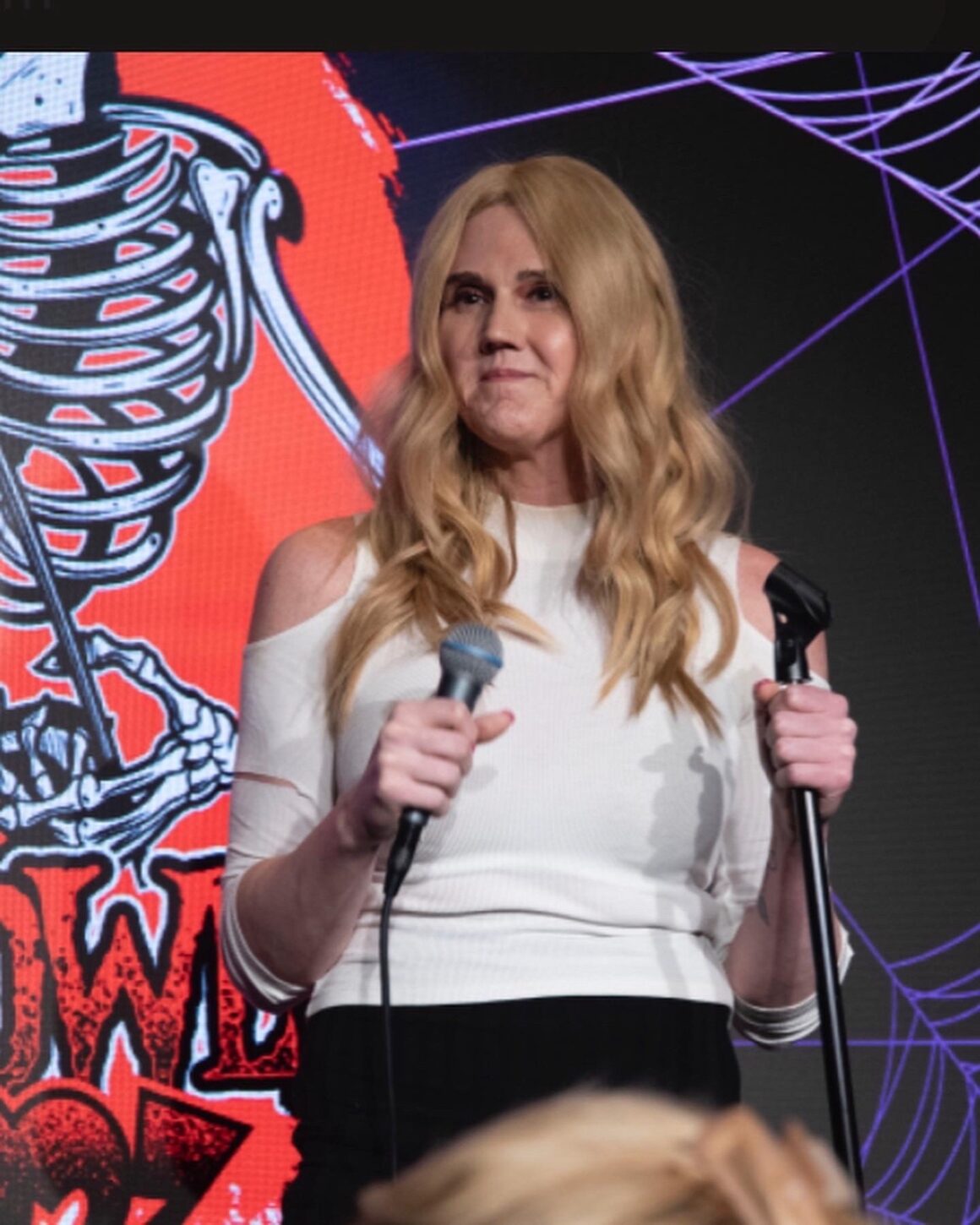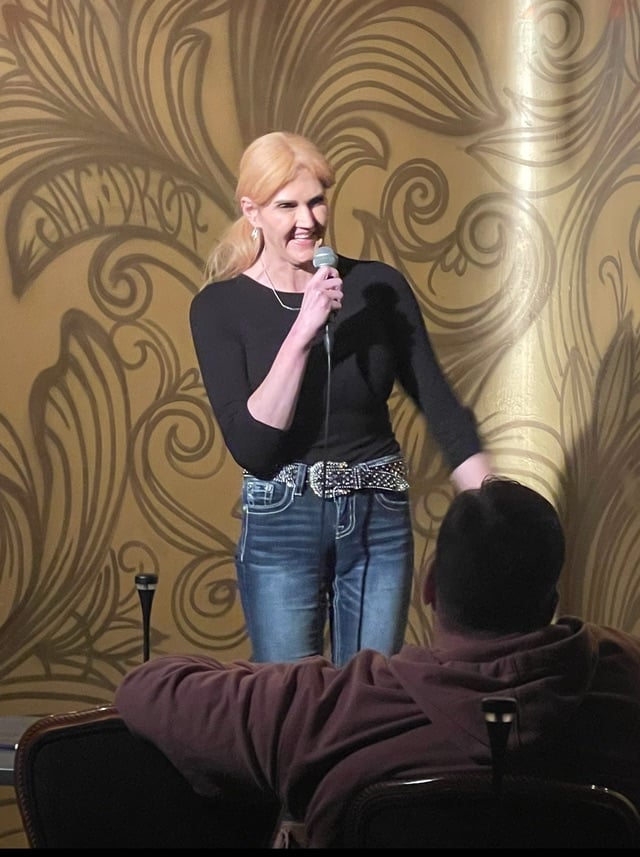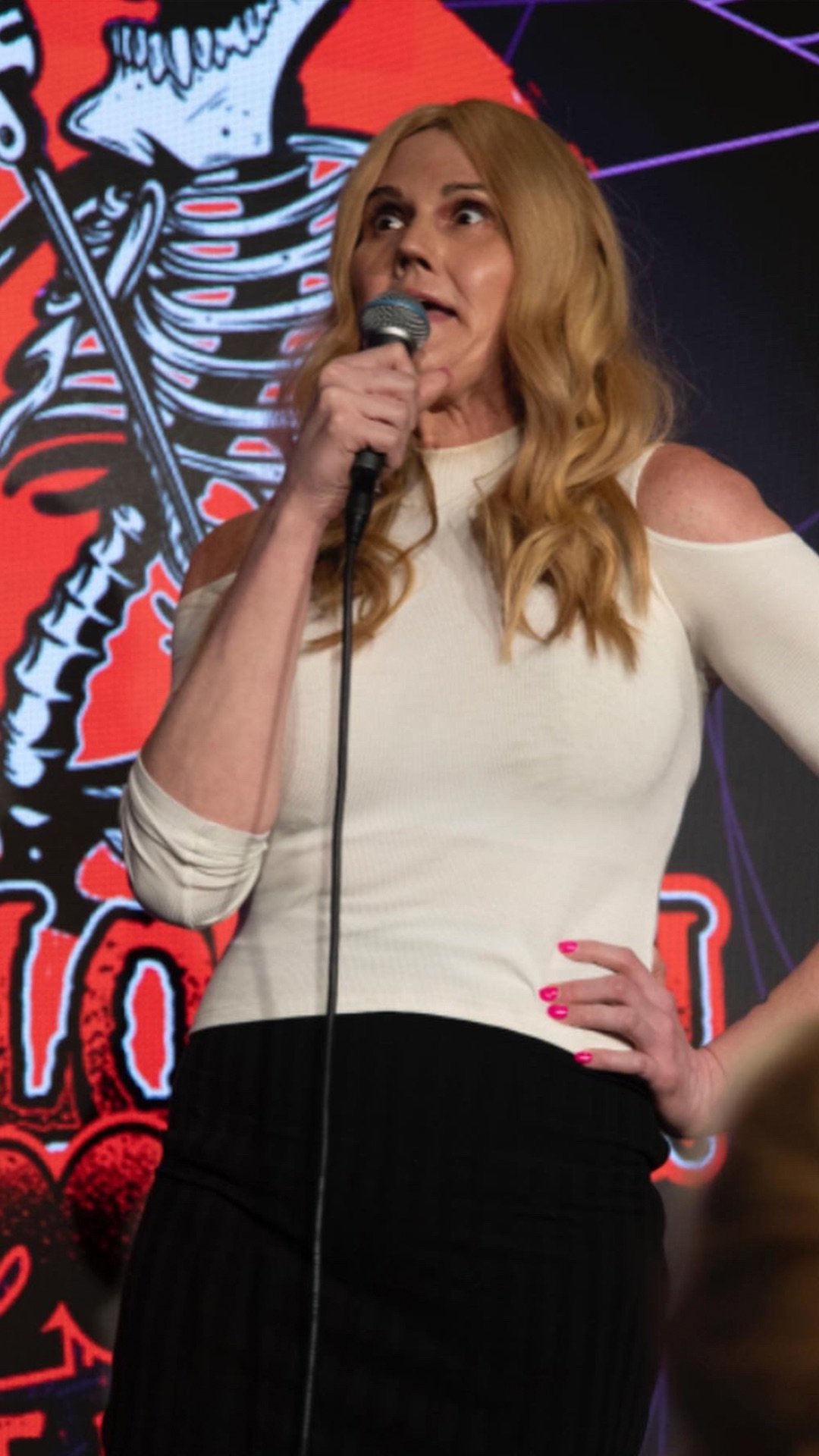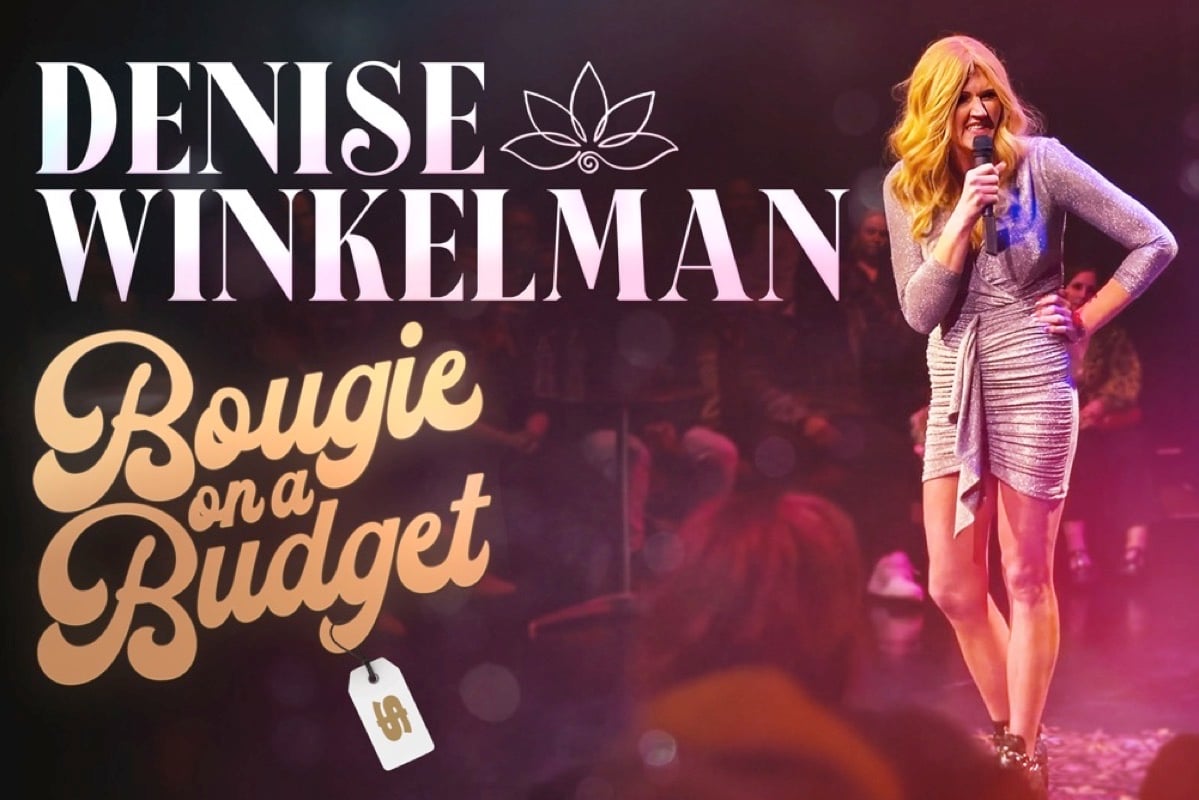Denise Winkelman is no stranger to transformation on stage, in life, and in spirit. A former professional wrestler and fitness model turned razor-sharp comedian and award-winning screenwriter, Denise brings her full story to the mic in her debut stand-up special Bougie on a Budget, premiering August 19 on Apple TV, Amazon Prime Video, YouTube, and more via Comedy Dynamics.
With disarming honesty and biting humor, Denise dives headfirst into her journey as a transgender woman raised by conservative parents, her experience living with fibromyalgia, and what it took to survive in the hyper-masculine world of pro wrestling. Her message is clear: being different doesn’t make you less but it might just make you fabulous.
Ahead of her release, Denise chats with us about comedy as catharsis, authenticity as survival, and why sometimes being yourself is the bravest (and funniest) thing you can do.
I love your special. I think it’s great.
Oh, thank you. Thank you. I’m so excited to share it with the world really. It’s been a while since we recorded it, so, it’s been a constant process.
How did you get your start in comedy?
Well, I have an interesting background. I grew up conservative in the middle of nowhere in Minnesota, and comedy was the last thing on my mind – but I knew I wanted to be in entertainment. I actually wanted to be in radio at the time. I thought it would be cool, but I was really into pro wrestling. I had always loved standup comedy. My graduating class was 18 people and one of my friends in high school used to say all the time, “You should be a standup. You’re so quick.”
I always loved standup. I just respected everybody doing it and was like, no, I could never do that…and I was really into wrestling, so I moved to Cincinnati when I was 23 years old and I was a professional wrestler for five years. I learned a lot about entertainment there but it just started to hurt too much at the time – and I had some other things to figure out because that was pre-transition. And so now I’m post-transition and, you know, it took some time in between. In 2017 I had kind of gotten through most of the transition and I was like, no, I really need to be funny and entertain people.
When I wrestled, I was bigger for the indies – at least height wise, I was six foot [tall]. My big thing was I could bounce around pretty well and so I could sell. I would take bumps for people, and it was just fun for me. I would do these promos that were really intense but they were really funny and, in a way, it was kind of like a different version of standup. It would always get people laughing. And so, in 2017, I started thinking like, okay, well I love talking and one of my best friends was in WWE and he told me I was the best talkers he ever heard, which is ridiculous, but like, I’ll take it and so we did a lot of that.
In 2017, I decided to do my first standup set. I told some people at a gender center in Denver that I wanted to do at some friends, and they were having a fundraiser and they put me on this fundraiser for eight minutes in front of 300 people. That was my first time ever doing comedy. I looked back on it and a lot of the stuff got laughs right away, which was helpful. But I was nervous. I was shaking the mic and a lot of things I would never do now, but that’s how I started and I just fell in love with it and I’ve been doing it ever since.


What was your process to put together a show like Bougie on a Budget?
It was a learning process for sure. Being in Denver, I got to do longer sets right up front, which was good. I was doing 15, 20 minutes before I should have ever done 15, 20 minutes, and I didn’t use any of that material six or seven years later, so I learned a lot about putting together a longer set.
I spoke to a lot of mentors who had headlined on the road for a long time and some of the ones I was really tight with helped me tighten it up and break it down. They gave me advice on that and it was a constant process. I mean, even the week before [the taping], we were changing certain things and making adjustments.
The thing I learned most was adding peaks and valleys because there are walls in comedy that are like seven minutes, 13 to 15 minutes, 23 minutes and then like every seven or eight minutes after that there are walls where people just automatically tune out, so if you just do the same thing over and over again, people are going to stop listening.
I was watching George Carlin’s documentary, which is excellent, highly recommended. The one on HBO. It’s a little long, but the first part was awesome, and it talked about how he kept reinventing himself. One of the things he would do in his sets, he would talk about something really heavy – like societal or something, religion or whatever it was – and then right after that, he would do a series of fart jokes. So, you know, it just keeps people on their toes.
There were some really good specials out there. I watched, even though I disdain what he did but Bill Cosby, one of his real famous ones, I think it’s called Himself. He’s excellent at just adding in the emotional ups and downs of comedy and you can see it actually shifts emotions and things like that. I learned a lot watching that. It’s about talking about things you care about but it’s also talking about how to keep the audience engaged and where they’re not just automatically tuning you out.
Bougie on a Budget covers a lot of ground, like your identity, your health, and your past lives and wrestling and modeling. What made now the right time to tell your story on stage?
I think it’s the perfect time to tell my story on stage because, being transgender, when I grew up, I didn’t even know what trans was as far as the meaning of the word. I remember I learned about it on Maury, when he was doing the “man or woman” segments, which are just ridiculous.
But at the time we didn’t really know and I was like, that’s what I am as far as transgender and it made me realize that things were getting better, right? And now things have become very restrictive, very polarizing for the trans community. And I truly believe that representation matters. I just think it’s very important.
So, the actual special is Bougie on a Budget and I have a lot of fun with that about how I shop at Goodwill and I should be better off than I am, you know, that kind of thing. We have fun with “bougie on a budget”, but the actual theme of it is to be yourself, be authentic and we do like this big emotional moment at the end. I’m really proud of it and I think this is the perfect time because there’s not a lot of strong trans people because of just how polarized things are right now.


You’ve lived through some incredibly intense experiences. How did comedy become your outlet?
I just always loved making people laugh and even in meetings – I worked the corporate world for a long time – being able to tell jokes or get people smiling out of the blue and they’d be like, “What did you just say?” Being able to do that on stage in front of a lot of people and figuring out different ways to make them laugh or ways to apply something. It’s, for me, the athletic side is, is you’re constantly pushing yourself and it’s like you’re competing with yourself.
It’s also like there’s a constant mode of growth and so much to learn and everybody has a different style. So, I had to learn what works for me but I love that part of it and I love being able to share my stories, even early on – because the first two years I didn’t talk about being trans on stage – but since then, when I started talking about it, I would have parents come up to me after the show and tell me their kid was trans, and it just meant a lot to them to be able to see someone be funny about it. Those are really cool moments for me.
Your transition journey is central to your comedy but you go beyond that. What do you hope that both LGBTQ+ audiences and straight audiences will take away from your work?
That trans people can be funny, number one, but it’s surprising because I think I’m funny to all groups. I am very funny to the LGBTQ+ [audience]. Those are my people but also, you know, it’s surprising how many straight people watch me get me – when they give me a chance – and love my comedy. I’ll have a lot of straight guys come up and be like, that was hilarious. I think representing myself even an opportunity to learn about the trans community because there’s a lot of misinformation out there.
But then just being able to be silly, playful, we’re all going through this together, you know, this experience of life right now. And, to be able to have something to laugh about and keep you on your toes, I think is really important.


In addition to your standup, you’re an award-winning screenwriter. Do you plan on getting more into writing as well as doing the comedy?
Well, we put a lot of work into this dramatic pilot called The Authentic Step, which was loosely based on my transition. It also had a comedy element with it, which was fun. It did really well in festivals. I would love to get more into it but, right now, comedy is kind of the focus. I’ve started playing around and adding many more characters into my act. I think acting will be the focus before screenwriting, but it is something I love to do. I always love to write and I have a lot of ideas for things, so it’s something I would love to revisit.
What is like the end goal? Would you like to end up with your own sitcom? Would you like to end up writing your memoirs? What is the “big goal” that you haven’t hit yet?
I want to tour and, tour very consistently. I want to be a name. I love what Iliza [Shlesinger] did. I love how she built her brand. I love Nikki Glaser and Bert Kreischer, you know, how they kind of started doing clubs and then just moved up and expanded their fan base. So that’s the immediate goal, but I want to be on everything. I want to be silly. I want to play around with people. That’s one element of wrestling that I used to love is they would make these really awkward promos and stuff and, but you would get to work with people.
What’s something you wish someone had told you earlier in your journey?
This is actually something I say in the special at the big moment, so, spoiler alert. I wish somebody would’ve told me when I was a kid that it’s okay to be different. Growing up conservative and Christian. My parents are evangelical Christians from a small town, so we didn’t meet a lot of people who were different, and it wasn’t really until I started wrestling that I got to meet and be friends with gay and lesbian folks at that time and then you just learn that it’s okay to be different.
And what’s really interesting in my story is when I came out to my friends who were wrestling at the time, right before I moved to Denver. I told them that I was trans and I expected a lot of bad reactions, so to speak, and every single one of them were just awesome. They were like, yeah, it’s no big thing. It’s not a big deal. I’ve seen them a few times since then and they’re just awesome about it and I wish I would’ve been able to tell them earlier.
What advice do you have for people who are aspiring to be comedians?
A lot of people will tell you to, to go up all the time and I don’t believe that’s necessarily the case. You have to be comfortable on stage, but I think it’s more important to realize that there are different elements of work and sometimes when you just go up to go up, it wastes your time, it wastes everybody else time. So, if you’re going to go up, always have a goal or something that you’re going to work on.
Then take time to write and edit and promote or build your persona. You’ll learn who you are on stage but keep learning. If you’re not sure on something, you know, the internet’s great, but you know, also watching a lot of comedy does help, but it is kind of figuring out what works for you. There’s no one size fits all. Comedy’s a buffet now.
I heard Roy Wood Jr., who’s on The Daily Show on a podcast he did. And I listened to a lot of podcasts. Bert Kreischer – even though sometimes it gets a little weird, but I love Bert and he talks the business of comedy a lot. Roy Wood was on a podcast and he said he would always go to open mics and go to shows and he would listen to what other people would talk about and then he would just cross it off his set list and he would make sure all the material he had on that he would do something else.
One of the reasons I did this special was that I just felt that nobody was going to pat me on the shoulder and tell me I was good enough, so I better create something on my own. I wanted to create something special and I put a ton of work into it and it looks like it’s going to pay off. Bougie on a Budget is available wherever you stream on August 19 through Comedy Dynamics. Follow Denise on Instagram, YouTube, Facebook, TikTok and on her website
Join the SL Community
Have an opinion on what you just read? Sign up to be a part of the Socialite Life community in order to post a comment, bookmark your favorite articles, topics, and contributors.


